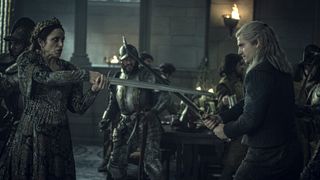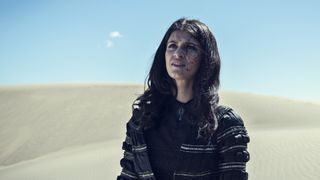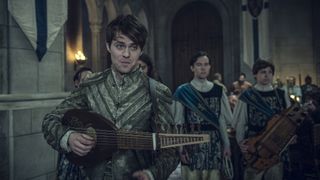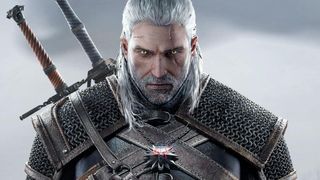The Witcher episode 4 recap: Our heroes deal with a cursed knight and a magical assassin
Ciri visits an enchanted forest, Yennefer faces an assassin, and we learn the intricacies of the Law of Surprise.

Episode 4/8
"Of Banquets, Bastards, and Burials"
Written by Declan de Barra
Directed by Alex Garcia Lopez
★★★
We're reviewing and recapping all eight episodes of Netflix's new Witcher TV series—from the perspective of a fan of the Witcher game series.
We rejoin Ciri in the woods, following those eerie, whispering voices. As she moves deeper into the trees, the voices intensify and overlap, chanting her name. Then, suddenly, the snow and withered trees transform into lush greenery, and Ciri sees a glowing light. But before she can get close, she finds herself surrounded by a group of tribal-looking… elves? "If she runs, kill her." a woman, the leader, says to her group in elder. Ciri says her name is Fiona, that she's lost. The woman tells her she's in a place called Brokilon Forest.
By this point, The Witcher has really hit its stride. I didn't like this episode as much as the others—maybe because it was the first one not to feature a monster hunt—but there are some great moments here, particularly the scenes where a more mature, powerful Yennefer butts heads with an assassin. This episode also made me realise that this is not a totally linear series. We see Geralt, already friends with Jaskier, whom he met in episode two, at a banquet hosted by Calanthe—who we saw die in episode one. Honestly, it's a bit disorientating.
In a tavern, a patron regales a captive audience with a tale about a man, a White Wolf, battling a creature on a frozen lake. The yarn ends with the witcher being eaten, but just as he finishes the story Geralt bursts through the door, covered in blood and guts. "I had to get it from the inside." he says, matter-of-factly. Jaskier begins to sing what has become Geralt's theme song: "Toss a coin to your witcher / A friend of humanity." The tavern sings along. Seems Jaskier really is improving Geralt's reputation in the world, as he promised he would.
And then, the scene we've all been waiting for. Yes, it's Tub Geralt.
The witcher washes the monster's guts off as Jaskier asks him to accompany him to a feast, which he is lending his bardly services to. Seems Jaskier has been sleeping around with a number of Cintran ladies, and some of the lords are none too pleased. He needs Geralt for protection. The witcher says he doesn't want to get involved in the "petty squabbles of men." To which Jaskier correctly points out: he frequently does. Defeated, the witcher reluctantly agrees to go with him.

Prepare for The Witcher season 2 with all of our episode guides:
1. The End's Beginning
2. Four Marks
3. Betrayer Moon
4. Of Banquets, Bastards, and Burials
5. Bottled Appetites
6. Rare Species
7. Before a Fall
8. Much More
A cleaned-up, velvet-clad Geralt arrives at the banquet—a marriage feast thrown for Calanthe's daughter, Pavetta. Suitors from different kingdoms are in attendance, all vying for Pavetta's hand in marriage. Mousesack, who we first met in episode one, has his money on Crach an Craite—a rowdy, beer-swigging young lad who you may remember meeting on Skellige, as an older man, in The Witcher 3. Occasionally the assembled lords argue and wrestle. Pavetta is not impressed by their loutishness, nor does she seem interested in any of them.
The biggest gaming news, reviews and hardware deals
Keep up to date with the most important stories and the best deals, as picked by the PC Gamer team.
Calanthe makes a dramatic entrance, armour splattered with blood. "A few upstart townships in the south needed reminding who was Queen," she says gleefully. Her subjects cheer. Later, Geralt asks her why she fights when she could just sit on her throne in comfort. "There's a simplicity in killing monsters." she says. I also get the impression that Calanthe has the hots for Geralt. But who wouldn't? "Seems we are quite the pair." she says, looking at him with a hunger in her eyes. Geralt responds as he usually does, with a grunt.
Back in Brokilon Forest, the leader of the group, whose name we still don't know, reveals to Ciri that they are not elves, but dryads—a race of all-female wood nymphs who have lived in the forest for aeons. Ciri is relieved to be reunited with Dara and watches as one of the dryads removes the arrow from his shoulder, healing it with a magical water. Later, Ciri reveals her true identity—Princess Cirilla of Cintra—to a shocked Dara. "Your grandmother slaughtered my family." he says. He was the only survivor, because he fled. Ciri refuses to believe that her grandmother, Calanthe, would do such a thing.
Back in Cintra, a Lord Peregrine of Nilfgaard makes his case for marrying Pavetta. He's laughed out of the room, Calanthe telling him Nilfgaard is the "shit rag of the south." Compare this to the first episode, when the Nilfgaardian army conquers Cintra, resulting in Calanthe's death and the destruction of her kingdom. Maybe she should've been nicer to the lad, eh? Then, suddenly, a commotion. A man wearing an armoured helm fights his way into the feast, kneels before the Queen, and says he's come to claim Pavetta's hand.
She's a "glorified royal arse wiper" who has spent the last three decades "cleaning up stupid political messes."
Somewhere on the road to… somewhere, Yennefer is bored. She's riding in a wagon with Queen Kalis of Lyria, who laments her life, describing herself as little more than a "fleshy contraption for squeezing out heirs." The Queen is cradling a baby girl as she speaks. Yennefer says her life isn't much better. She thought becoming a king's mage was her destiny. Instead, she's a "glorified royal arse wiper" who has spent the last three decades "cleaning up stupid political messes."
Then, in a flash, her life suddenly gets more exciting. A sword rips through the canvas above her, its blade coated in blood. Yennefer opens a window in the wagon and sees fighting outside, her face splattered with more of the red stuff. She steps outside and the soldiers accompanying the Queen are dead, gutted. Then the assailant appears: a cloaked mage accompanied by a nasty-looking, crab-like critter with razor-sharp claws. Yennefer springs to action, conjuring up a portal and escaping into it with the terrified Queen and her child.
It seems the King has had enough of his wife not being able to produce a male heir, and has sent this assassin to kill her. What follows is a thrilling portal chase through a series of wildly different landscapes: a desert, a rain-soaked village, a barren wasteland. But Yennefer can't shake the assassin: he's tracking something the Queen is wearing. Kalis, frustrated, blames Yennefer for what's happening. The sorceress is not happy and, in one of the episode's most cathartic moments, creates a portal, jumps in, and leaves the ungrateful Queen behind.
The mage approaches the Queen. She offers him the child, but he coldly sends a magical blade spinning towards her, slicing her throat and killing her. Yennefer suddenly appears, grabs the child, and escapes into another portal, appearing on a remote beach somewhere. But this was all too much for the child. She's dead. "Count yourself lucky," she says. "You've cheated the game and won without even knowing it." Yennefer buries the child in black sand, feeling sorry for herself and her unfulfilled destiny. This is a very different person from the meek, troubled trainee sorceress we met in episode two.

Back in Cintra, the masked man who fought his way into the feast reveals himself to be Lord Urcheon of Erlenwald. Calanthe scoffs, asking why a "knight of no renown" believes he is owed her daughter's hand in marriage. She asks him to remove his helmet, but she says he can't "until the sounding of the twelfth bell." Eist knocks it off ("Bollocks to that.") and the knight's face is revealed, to the horror of the court: he's half-man, half-hedgehog.
Calanthe orders Geralt to slay the knight, but the witcher refuses—this is no monster. The Queen's guards charge the knight, but he defends himself well; he's a skilled swordsman. Then Geralt joins in, and we see more of the show's superb choreography. Henry Cavill wields that sword like he was born with one in his hand.
It's revealed that, years ago, Urcheon saved the life of Calanthe's husband, King Roegner. In return he claimed the Law of Surprise, which dictates that a man saved by another is expected to offer his saviour a boon whose nature is unknown to one or both parties. In most cases, this 'boon' takes the form of the saved man's firstborn child. The Law of Surprise is a particularly complicated, weird part of the lore in The Witcher, but the show does a decent job explaining it. The fight spreads to the entire room. Eist, who has a deep respect for the Law of Surprise, joins Geralt and Urcheon. Destiny, it seems, has chosen Urcheon, hedgehog face and all, to be Pavetta's husband.
The dust settles and Pavetta embraces Urcheon. They've met before, secretly forming a bond. Calanthe is not pleased, but Eist insists she "honour destiny" or they risk unleashing its wrath upon them. Calanthe approaches Urcheon. "Here is your destiny." she says, pulling a dagger. But before she can stab the cursed lord, Pavetta screams, unleashing a surge of magical energy. Everyone around her, including Geralt, is sent flying backwards. The windows shatter. Wind howls. Geralt and Mousesack combine their powers to break the spell. "Do you believe in destiny now?" Eist asks Calanthe. "I thought your grandmother's gift had skipped you, as it did me." she says, stunned.

The Witcher 4: What we know
The Witcher season 3: Trailers and cast
Witcher 3 mods: Good hunting
The Witcher books: Where to start
And so the Law of Surprise is honoured: Pavetta and Urcheon are to be married. Calanthe weds the couple and Urcheon's curse is lifted. He transforms back into a human as Jaskier announces that this will be his greatest ballad yet. Calanthe insists Geralt be rewarded for his efforts. He doesn't want anything, he says, but when pushed he claims the Law of Surprise, not really intending to ever cash it in. And just as he does, Pavetta vomits: she's pregnant—with, you guessed it, Ciri. Mousesack urges Geralt to stay, but he declines. "Destiny is horseshit." But Mousesack is convinced, correctly, that Geralt will have a close bond with Pavetta and Urcheon's daughter, and if he isn't there, calamity will be unleashed. Geralt says he'll take the chance.
We jump forward in time, to Cintra in the wake of the Nilfgaardian invasion from episode one. A cloaked man finds Calanthe, cuts a rectangle of flesh from her corpse, and eats it. Cahir, the bird-headed rider who has been chasing Ciri, watches quietly. The man who ate the flesh convulses and shakes, and is gutted by another member of his group. She picks through his entrails (ugh) and determines, somehow, that Ciri is in Brokilon Forest. Cahir seems troubled by this discovery. "Armies are not the way into Brokilon Forest." We also learn that Mousesack is alive and well. As he's dragged away by Cahir's men, he secretly grabs a piece of Calanthe's clothing.
And finally, back to Ciri. She's having a dream, of fighting and bloodshed. We see a gory close-up of a man's ear being sliced off. Then a shot of Cahir, full of rage. He raises his sword, but she wakes up before the blade falls. The leader of the dryads asks Ciri to drink the forest's water, "from the source." She slices into the bark of a giant, magical-looking tree. Sap bleeds out and Ciri drinks it, finding herself in a strange, dreamlike desert, in which is planted an even bigger tree. Then an eerie voice calls to her. "What are you, child?"
Extra swigs
• The Hedgehog-faced Lord Urcheon, or Duny as he's sometimes called, is none other than Emhyr var Emreis, who, during the events of The Witcher 3, is the Emperor of the Nilfgaardian Empire.
• We see a young Crach an Craite in this episode. In The Witcher 3, Yennefer and Geralt meet him in Skellige while tracking Ciri. He one of the most respected warriors in the archipelago.
• A lot of lore is thrown around in this episode. If you're confused about anything, it's worth spending some time on a Witcher wiki, or just check out our introduction to the Witcher that defines some key terms—but there could be spoilers for episodes to come, so be careful.
If it’s set in space, Andy will probably write about it. He loves sci-fi, adventure games, taking screenshots, Twin Peaks, weird sims, Alien: Isolation, and anything with a good story.
As Netflix's The Witcher Season 4 loses another star, once again I feel compelled to tap the 'this no-budget YouTube fan film does the Witcher better' sign

I can only assume this upcoming Witcher children's book takes it easy on the folk horror, fantasy racism, and brutal violence I associate with the series
Most Popular


